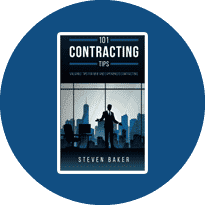
A highly experienced software tester with a retail banking background, Steven decided to take advantage of the greater earning potential of contracting in 2010. He has worked for a number of leading retail banks, including Santander, Lloyds Bank, Westpac and Rabobank.
In the typical ‘Kiwi’ tradition of seeing the world, the Auckland native’s journey has taken him to Sydney, Dublin, London, Glasgow and Edinburgh. Steven now lives in the Scottish capital with his wife and daughter.
We decided to test his knowledge in the first of our two-part interview…
I’m considering contracting as a career. What advice would you give me?
SB: First, you need to have a good reason. There are great rewards, but there are also risks and extra stress. So you have to know what your goal is for pursuing this change. Then start doing your due diligence: learn about your market by setting up job alerts and ringing recruiters, save up a war chest, and understand what kind of structure you need to set up (ie umbrella company or limited company). There are lots of resources and people out there who can help you make the transition. If it’s a viable move for you, I would encourage you to take the chance. Accept that there is a higher level of risk and if it doesn’t end up being your thing, you can always apply for a permanent role.
What’s the most important lesson you’ve learnt?
SB: Have a good attitude. It sounds cheesy but the best contractors I’ve seen are the ones that get on with their job, no matter what. That’s a mindset that allows them to overcome obstacles and deliver on their tasks – over and over again. I’ve seen people with awful attitudes and they can really slow down a team’s progress.
Should I actively build my contracting network on social media sites like LinkedIn?
SB: I couldn’t see myself without LinkedIn. I get a lot of connection requests and phone calls from recruiters due to the fact that I have set up a profile. It really is helpful in giving you a searchable online presence. That said, it is important to build and maintain your network in real life as well as online. In a world where increasingly everything is being done online, it is much easier to have an impact in person.
How do I forge strong relationships with new colleagues?
SB: In my experience, when you join a project, be proactive and introduce yourself to the people sitting around you, even if you won’t be working with them. You are still going to be nearby so breaking the ice early will make a good first impression. I’ve neglected this before and regretted it. Doing the same with any new starters who join after you is a good move as well. Then there are the people who may not physically be in the same building as you. Find out who they are and get in touch. It should make getting your work done a lot easier.
What’s the best way to deal with rate reductions when cost cuts happen?
SB: The first key point when you get wind of a rate cut is not to allow yourself to have any knee-jerk reactions. Investigate the market to see what the going rate is for what you do. If you don’t believe the rate cut is fair, you will be able to negotiate to keep your rate the same. Some contractors might find they’ve been below market rate all along and could even confidently push for a rate increase. It’s just a negotiation in the end, so having facts to back up your position will most definitely help.
Next time we’ll be looking at CVs, interviews, working abroad and why having the right attitude can make all the difference to contracting success. We’d love to hear about your experiences, and if you have any other questions for Steven, let us know.





Hello you 🙂